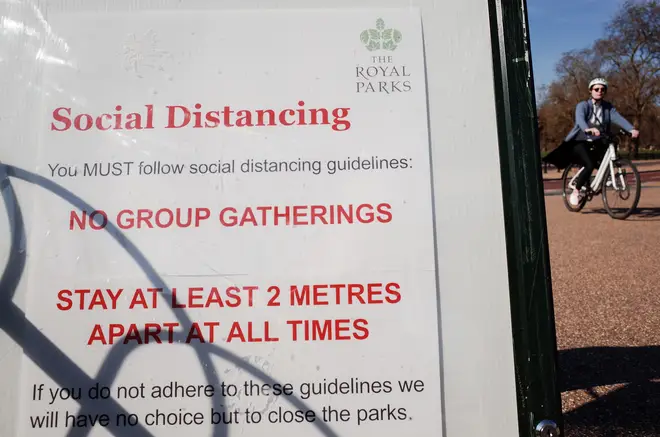
Matt Frei 10am - 12pm
27 March 2020, 10:03

As Brits get used to being isolated inside their own home in an effort to curb the spread of coronavirus, many have been left asking "In what circumstances can I go outside?"
With the UK Covid-19 lockdown in place and people told they are only allowed to leave their homes under limited circumstances many people want to know why they can go outside.
Here's everything we know about leaving your house during the coronavirus lockdown.
Why can you leave your home during the lockdown?
Read more: Can I drive during the UK coronavirus lockdown?
-shopping for basic necessities, as infrequently as possible
-one form of exercise a day - for example, a run, walk, or cycle - alone or with members of your household
-any medical need, to provide care or to help a vulnerable person
-travelling to and from work, but only where this absolutely cannot be done from home.
Read more: How does the coronavirus home testing kit work and when can I buy one?
Yes, the Covid-19 emergency measures will apply for at least three weeks, which will include weekends.
To ensure that people are staying at home and apart from each other, the Government is stopping all public gatherings of more than two people.
There are two exceptions to the rule: when the gathering is essential for work purposes, or when the gathering is "of a group of people who live together", according to the advice.
Read more: Are the police stopping people who go outside during the Covid-19 lockdown?
The example the Government uses is that a parent can take their children to the shops with them, if they cannot be left at home.
But some supermarkets, including Sainsbury's, are limiting the number of people allowed in stores at any one time to enforce social distancing.
Around 1.5 million vulnerable people across are England are being asked to "shield" themselves in self-isolation for at least 12 weeks, to avoid needing hospital treatment for Covid-19.
Official Government guidance says that those in the vulnerable group, which includes people with serious underlying health conditions, should "get out into any private space" - such as your own garden.
It states that you should keep at least two metres away from neighbours or other household members while doing so, including if you are sitting on your doorstep.
For those in the vulnerable group who do not have their own private space, the Government advises spending time with the windows open to let in fresh air, or arranging a space to sit and get some natural sunlight.
People are allowed to leave the house for medical needs - which includes going out to give blood.
A spokesman for NHS Blood and Transplant said: "People can still donate blood. Giving blood is classed as a medical need and a form of helping vulnerable people.
"It is essential to patients and the NHS. If you are fit and well, please keep donating as normal."
Shopping for basic necessities, such as food and medicine, must be as infrequent as possible, according to the advice.
When announcing the lockdown measures, the Prime Minister said the public should use food delivery services "where you can".
While Boris Johnson did not say how many times a day people could go to the supermarket, or how many shops they could go to, he said people should be shopping "as little as you can" - suggesting that, unless the item is essential, you should not go to another shop and just return home.
The Government has said just one form of exercise per day is permitted per person - which includes dog walking.
Although the official advice does not specify the length of time you can exercise, it says people "should be minimising time spent outside of the home" while keeping at least two metres apart from anyone you do not live with.
For those who have a dog that requires exercise more than once a day, dog walking duties can be shared between members of the same household.
Probably not. Nothing in the official guidance states that people cannot drive somewhere for exercise, but it does say that people should avoid travelling unless it is essential.
However, police in some areas have started stopping drivers and checking if their journey is absolutely essential. And police in Derbyshire even used a drone to shame those who drove to National Parks to walk their dogs.
Petrol stations, like corner shops, pharmacies, supermarkets, hardware stores, banks and bike shops, are able to stay open during the pandemic.
Garages will also remain open for essential repair work.
Tending to an allotment counts as a form of exercise as long as social distancing is maintained, according to Cabinet Office Minister Michael Gove.
"I think it is perfectly sensible for people to go to an allotment," he told reporters.
"It is in the very nature of an allotment that there is a safe distance between people working on individual allotments."
As the Government has banned gatherings of more than two people, this must also be observed on allotments.
No - your one form of exercise a day, which includes running, walking or cycling, can only be done alone or with people you live with.
This means that you should not be exercising - or cycling - with anyone outside your household.
The British Dental Association (BDA) is advocating that dental professionals treat emergency cases only during the outbreak.
It said practices are urged to make their own risk assessments to determine what is safe and what can be delivered under an emergency-only service, so anyone with concerns about their teeth should contact their dentist directly.